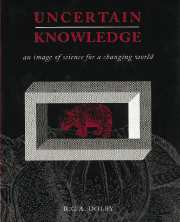1 - Introduction
Published online by Cambridge University Press: 28 January 2010
Summary
The problem: understanding natural science as cognitive activity
Science is a victim of its own success. It has changed the world into one which judges more harshly the manner in which knowledge is created, maintained, and applied. Scientific knowledge becomes simultaneously easier to create and to criticise. We now live in a world which appears to have reduced the incalculable dangers of what once lay outside the horizons of our knowledge, but has made more worryingly obvious the risks inherent in our knowledgeguided actions. Although science is continually eliminating past errors while increasing the precision and range of its knowledge, it also undergoes infrequent revolutions which abandon earlier apparent certainties. The increasing power given to us by science to adapt the world to our desires is not accompanied by equal knowledge of the best way to implement such power. Indeed, science makes it easier to appreciate the problems that the power to change things has already produced. It is no wonder that people are increasingly ambivalent towards science. Perhaps it is a self-limiting system, the repeated operation of which cumulates problems it cannot handle.
And yet science still provides hope for the future. Within its limits, it is a powerful generator of new understanding, of resources for dealing with problems that threaten to overpower us. Indeed, we are now locked into a form of life that is only sustainable by the continuing growth of scientific knowledge. We cannot go back to any of our romantically reconstructed pre-scientific pasts without some intervening catastrophe to cut back our material expectations and our population.
- Type
- Chapter
- Information
- Uncertain KnowledgeAn Image of Science for a Changing World, pp. 1 - 10Publisher: Cambridge University PressPrint publication year: 1996



